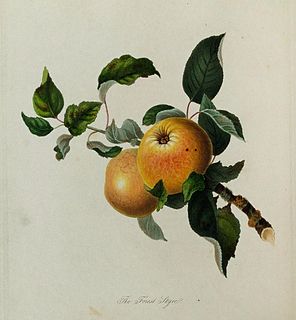| Malus domestica 'Chisel Jersey' | |
|---|---|
| Cultivar | 'Chisel Jersey' |
| Origin | |
The 'Chisel Jersey' is a cultivar of cider apple originating in Somerset.
| Malus domestica 'Chisel Jersey' | |
|---|---|
| Cultivar | 'Chisel Jersey' |
| Origin | |
The 'Chisel Jersey' is a cultivar of cider apple originating in Somerset.
The term "Jersey" or "Jaysey" is applied to bittersweet type cider apples in Somerset; the equivalent varietal terms in Herefordshire and Gloucestershire are "Norman" and "French" respectively. [1]
"Chisel" may be derived from the old dialect word chesil, meaning a pebble, and refer to the apple's small, russetted appearance and hardness. [2]
'Chisel Jersey' is thought to have originated in the 19th century in Martock and for around a century was planted little outside the immediate area. [3] During the mid 20th century it was more widely planted in commercial orchards in Somerset and Dorset, and can still be found despite the subsequent destruction of many older orchards.
In the Martock district 'Chisel Jersey' was believed to be one of the parents of the commercially important cultivar 'Dabinett', a belief supported by subsequent research by the Long Ashton Research Station.
'Chisel Jersey' is a full "bittersweet" apple, high in tannins and sugars and relatively low in malic acid. The fruit are small, green with a striped red flush, and ripen late in the year: they usually have a distinctive offset stem (hence its alternative name 'Sidestalk Jersey'). In some seasons virus infection can tend to produce small, cracked, heavily russetted fruit. [4] The fruit somewhat resembles that of the cultivar's supposed offspring 'Dabinett', albeit the latter is less tannic. The cultivar 'Sandford Jersey' was commercially planted in Herefordshire under the name 'Chisel Jersey', but can be distinguished from the true cultivar by the lack of an offset stem. [4]
The tree is diploid and though self-sterile is an excellent pollinator.
Perry is an alcoholic beverage made from fermented pears, similar to the way cider is made from apples. It has been common for centuries in England, particularly in the Three Counties ; it is also made in parts of South Wales and France, especially Normandy and Anjou. It is also made in Commonwealth countries such as Canada, Australia, and New Zealand.

Cider apples are a group of apple cultivars grown for their use in the production of cider. Cider apples are distinguished from "cookers" and "eaters", or dessert apples, by their bitterness or dryness of flavour, qualities which make the fruit unpalatable but can be useful in cidermaking. Some apples are considered to occupy more than one category.

The 'Roxbury Russet' is an apple cultivar, believed to be the oldest apple cultivar bred in the United States, having first been discovered and named in the mid-17th century in the former Town of Roxbury, part of the Massachusetts Bay Colony southwest of Boston. It is known by several other names including 'Boston Russet', 'Putnam Russet', and 'Sylvan Russet'.

The Kingston Black, also known as Black Taunton, is a cultivar of apple originating from the United Kingdom and used in making cider. The name of the cultivar comes from the apples' dark red or purplish skin, though despite the name, the fruit does not have a black hue.

'Dabinett' is an apple cultivar, customarily used in Somerset for making cider.
'Brown Snout' is a 19th-century cultivar of cider apple originating in Herefordshire in the United Kingdom, though now grown in other counties and parts of the world.

The Foxwhelp is a very old cider apple cultivar, originating in the west Midlands of England.

The Styre or Stire, also known as the Forest Styre, was an old English variety of cider apple which was formerly common in the Forest of Dean. It is currently thought to be extinct, but may still survive in old orchards or gardens.

The Redstreak, also spelt Redstrake, Red Streak or Red-streak, is or was a very old variety of cider apple formerly commonly planted in England.
Cider in the United Kingdom is widely available at pubs, off licences, and shops. It has been made in regions of the country where cider apples were grown since Roman times; in those regions it is intertwined with local culture.
The Hangdown, also known as Hangydown, Horner, or the Pocket Apple, is a traditional variety of cider apple grown mostly in Somerset and North Devon.

Slack-ma-Girdle is an old variety of cider apple formerly widely grown in the South-West of England. It is one of a group of similar and closely related varieties all often known by the name "Woodbine".
Crimson King, also known as John Toucher's or the Bewley Down Pippin, is a traditional cider apple cultivar originating in Somerset.

The Woodcock was one of the oldest described English varieties of cider apple. It originated in the West of England in the counties of Herefordshire and Gloucestershire.
Ellis Bitter, also called Ellis's Bitter or Ellis's Bitter-Sweet, is an English cider apple originating in Devon, but now widely planted across the west of England.
Michelin is a variety of cider apple commonly grown in commercial orchards in the United Kingdom, although originating in France.
The Coccagee, also spelt 'Cackagee' or 'Cockagee' and sometimes known as the 'Irish Crab' or 'Lord Cork's Crab', is or was a variety of cider apple, known in Ireland and the West of England.
Yarlington Mill is a traditional cider apple cultivar originating from the village of Yarlington, in the North Cadbury area of Somerset, England.
Major is a cider apple cultivar first grown in the United Kingdom in the area of Devon and Somerset.
Cap of Liberty, also known by the name Red Soldiers or Bloody Soldier, is a traditional cider apple cultivar originating in the Martock area of central Somerset.